12/1/2014
Maine Supreme Court Endorses Confusing School Bus TicketsHigh court in Maine convicts a driver for passing a school bus at a T-intersection.

Photo enforcement companies see school buses as a lucrative source of revenue. Passing a school bus can generate an expensive ticket, and this happens most often when motorists are confused in situations where it is not clear exactly what constitutes a violation.
Last week, Maine's Supreme Judicial Court considered this gray area of the law in the case of the school bus passing ticket issued to Melanie S. Mourino on May 6, 2013. She had been driving her son to daycare in Bar Harbor when she came up to the "T" intersection of Ash Street, which ends at Park Street. As she stopped at the stop sign, she saw a school bus parked to her left on Park Street. She could see small feet entering the bus from the opposite side of the road, but since she was perpendicular to the bus, she could not see the extended bus "stop" sign or the flashing lights. So Mourino turned left, away from the bus, proceeding on her way.
Bus driver Kathy White wrote down Mourino's license plate, knowing the intersection was a hot spot for writing tickets. Bar Harbor Police Officer Larry Fickett took White's statement and issued Mourino a ticket, which Mourino contested all the way to the high court.
"The operator of a vehicle... on meeting or overtaking a school bus from either direction when the bus has stopped with its red lights flashing to receive or discharge passengers, shall stop the vehicle before reaching the school bus," Maine Statutes Section 2803 states.
Mourino argued that the phrase "from either direction" clearly means approaching it from the front or the rear, not at a "T" intersection. The Supreme Judicial Court was not persuaded.
"Here, even assuming arguendo that Mourino's interpretation of the statute is correct, the court could find from the evidence that Mourino was parallel to the stopped school bus at its approximate midpoint immediately after she turned left from Ash Street onto Park Street, that the bus's red lights were flashing, and that Mourino had not been signaled to proceed," Justice Andrew M. Mead wrote for the court. "At that point, applying the plain language of the statute, Mourino was 'meeting' the bus, and, by continuing past it, she was 'overtaking' the bus."
Although this case did not involve school bus cameras, it sets an important precedent. Maine banned photo enforcement in 2009, allowing only an exception for toll road cameras (view law). Some school districts in the state, including Regional School Unit 21 in Kennebunk, ignore the law and use cameras to create violations worth a minimum of $250. Under state law, the owner of the vehicle will have his license suspended upon a second bus passing accusation -- with or without a camera, even if the vehicle owner can prove that he was not driving at the time of the alleged offense.
A copy of the decision is available in a 100k PDF file at the source link below.


